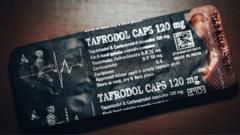The Indian government has taken decisive action by banning two highly addictive opioids, tapentadol and carisoprodol, following an investigation that revealed their role in a devastating public health crisis in West Africa.
India Takes Action Against Opioid Crisis by Banning Two Dangerous Opioids

India Takes Action Against Opioid Crisis by Banning Two Dangerous Opioids
In response to alarming findings, India halts the production and export of dangerous opioids linked to West African health crisis.
The recent actions stem from a BBC investigation that exposed the illegal export of these opioids by Mumbai-based Aveo Pharmaceuticals to countries like Ghana, Nigeria, and Cote D'Ivoire, where they have contributed to widespread addiction. India's Drugs Controller General, Dr. Rajeev Singh Raghuvanshi, confirmed the withdrawal of permissions for production and export in a letter that cited the investigation.
The Mumbai factory of Aveo was raided, and all stock was confiscated by India's Food and Drug Administration (FDA). Dr. Raghuvanshi's ban applies to all combinations of tapentadol and carisoprodol, effective immediately, highlighting concerns over substance abuse and its dire consequences on public health.
Tapentadol is recognized as a potent opioid, and the muscle relaxant carisoprodol is notorious for its addictive properties, leading to its ban in Europe. Although it is approved in the US for short-term use, longer exposure can result in withdrawal symptoms like anxiety, insomnia, and hallucinations. The combination of these drugs poses severe health risks, including respiratory complications and potential overdose deaths.
Despite these dangers, their low cost and easy availability have made them popular in several West African nations. Investigation data revealed that Aveo Pharmaceuticals and its affiliate, Westfin International, have shipped millions of pills to West Africa, with Nigeria identified as a major market due to its significant opioid abuse problem, affecting around four million citizens.
The BBC's investigation included undercover footage showing interactions between an operative posing as a businessman and Aveo's director, Vinod Sharma. In this meeting, Sharma openly acknowledged the harm caused by the drugs while expressing a business-first attitude towards their sale.
Following the BBC's revelations, the FDA has committed to further actions against Aveo, stating their readiness to tackle any illegal practices that undermine India’s reputation in the pharmaceutical industry. The agency will conduct additional inspections to prevent the ongoing distribution of these dangerous substances.
As India seeks to uphold public health, the situation highlights the urgent need for stringent regulations in the pharmaceutical sector to combat the global opioid crisis.
The Mumbai factory of Aveo was raided, and all stock was confiscated by India's Food and Drug Administration (FDA). Dr. Raghuvanshi's ban applies to all combinations of tapentadol and carisoprodol, effective immediately, highlighting concerns over substance abuse and its dire consequences on public health.
Tapentadol is recognized as a potent opioid, and the muscle relaxant carisoprodol is notorious for its addictive properties, leading to its ban in Europe. Although it is approved in the US for short-term use, longer exposure can result in withdrawal symptoms like anxiety, insomnia, and hallucinations. The combination of these drugs poses severe health risks, including respiratory complications and potential overdose deaths.
Despite these dangers, their low cost and easy availability have made them popular in several West African nations. Investigation data revealed that Aveo Pharmaceuticals and its affiliate, Westfin International, have shipped millions of pills to West Africa, with Nigeria identified as a major market due to its significant opioid abuse problem, affecting around four million citizens.
The BBC's investigation included undercover footage showing interactions between an operative posing as a businessman and Aveo's director, Vinod Sharma. In this meeting, Sharma openly acknowledged the harm caused by the drugs while expressing a business-first attitude towards their sale.
Following the BBC's revelations, the FDA has committed to further actions against Aveo, stating their readiness to tackle any illegal practices that undermine India’s reputation in the pharmaceutical industry. The agency will conduct additional inspections to prevent the ongoing distribution of these dangerous substances.
As India seeks to uphold public health, the situation highlights the urgent need for stringent regulations in the pharmaceutical sector to combat the global opioid crisis.




















